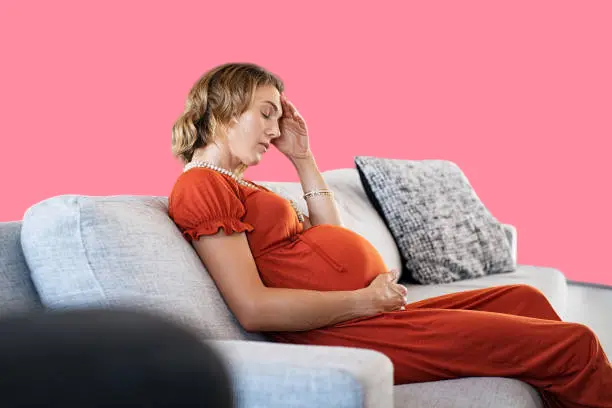Constipation is one of the most bothersome symptoms that can accompany pregnancy, due to the physical and hormonal changes a woman experiences.
Although it is a common problem, ignoring it can cause complications that affect the pregnant woman's comfort and quality of life. Therefore, it is important to understand its causes and follow effective and safe treatment methods.
Common Causes of Constipation During Pregnancy

Several factors during pregnancy lead to slow bowel movements and constipation, including:
- Hormonal changes that affect the muscles of the digestive system.
- The pressure of the expanding uterus on the intestines.
- Taking iron supplements.
- Lack of physical activity.
- Changes in diet.
The Effect of Progesterone on Digestion
Elevated levels of progesterone cause muscle relaxation, which slows bowel movements and causes constipation in pregnant women:
- It reduces intestinal cramps.
- It increases the time food remains in the digestive system.
- It leads to excessive water absorption from the stool.
The Role of Iron Supplements in Constipation During Pregnancy
Iron is essential for pregnant women, but it contributes to constipation as:
- Iron causes dryness in the colon.
- It slows down bowel movements.
- It can be treated by changing the type of supplement.
Poor Nutrition During Pregnancy
Lack of fiber and fluid intake exacerbates constipation during pregnancy:
- Eating low-fiber foods.
- Drinking insufficient amounts of water.
- Eating too many starchy and fried foods.
Physical Activity and Its Effect on the Digestive System
Inactivity during pregnancy reduces normal bowel movements as:
- Lack of movement leads to slow digestion.
- Moderate activity stimulates the intestines.
- Daily walking is a suitable option for treating constipation in pregnant women.
Psychological Changes and Stress
Stress affects the digestive system and contributes to its disturbance as:
- Psychological stress slows down excretion.
- Anxiety increases the severity of constipation.
- Relaxation exercises help improve symptoms.
The Best Foods to Treat Constipation During Pregnancy
A healthy diet can relieve constipation naturally and safely, such as:
- Leafy vegetables.
- Fiber-rich fruits, such as figs and prunes.
- Whole grains, such as oats and bulgur.
- Drinking natural juices, such as orange juice.
Safe Home Remedies During Pregnancy

Simple methods that can be followed to relieve constipation without medication include:
- Drinking a cup of warm water on an empty stomach.
- Gently massaging the abdomen.
- Drinking a flaxseed infusion.
- Eating yogurt with chia seeds.
When should you see a doctor?
Some cases of constipation require medical intervention to avoid complications, such as:
- Constipation lasting more than a week.
- Severe abdominal pain.
- Blood in the stool.
- Failure to improve despite changing your habits.
Medications to Treat Constipation During Pregnancy
Some laxatives can be used during pregnancy, including:
- Laxatives in suppository form.
- Medications containing lactulose.
- Avoid strong laxatives or bowel stimulants.
Warning: Please do not take any medication without consulting your doctor.
Article Summary
Constipation during pregnancy is a common problem, but it can be controlled through healthy daily habits.
Prevention begins with a fiber-rich diet, regular water intake, and light physical activity. Relaxation and stress relief also help improve digestion. If constipation persists, consult a doctor to avoid any potential complications.